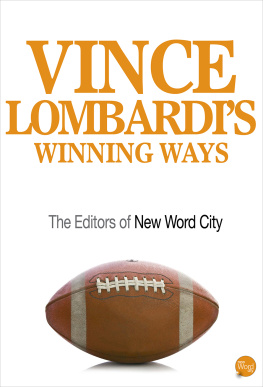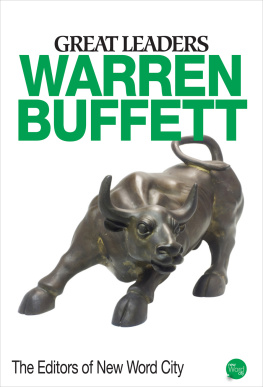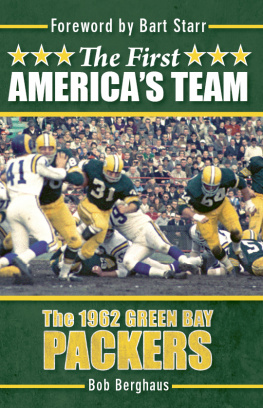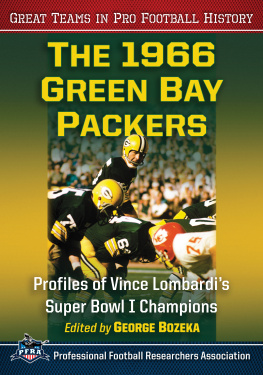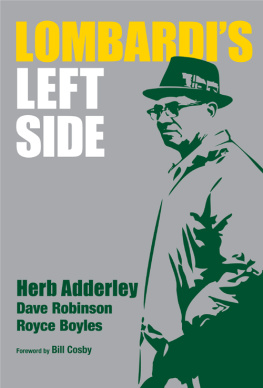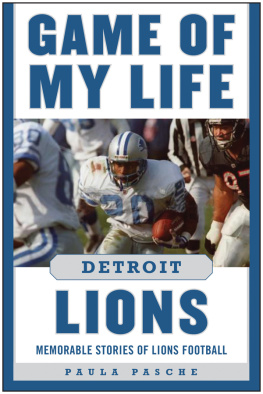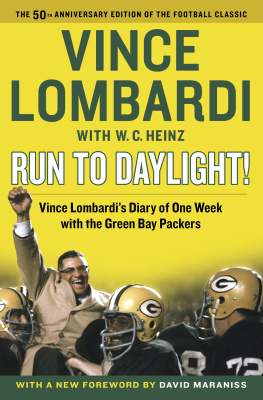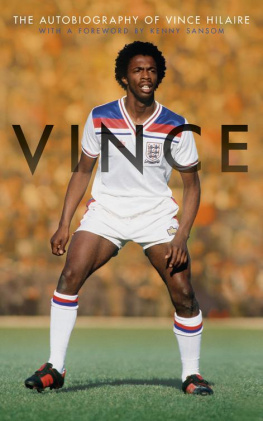The Editors of New Word City - Vince Lombardis Winning Ways
Here you can read online The Editors of New Word City - Vince Lombardis Winning Ways full text of the book (entire story) in english for free. Download pdf and epub, get meaning, cover and reviews about this ebook. year: 2014, publisher: New Word City, Inc., genre: Home and family. Description of the work, (preface) as well as reviews are available. Best literature library LitArk.com created for fans of good reading and offers a wide selection of genres:
Romance novel
Science fiction
Adventure
Detective
Science
History
Home and family
Prose
Art
Politics
Computer
Non-fiction
Religion
Business
Children
Humor
Choose a favorite category and find really read worthwhile books. Enjoy immersion in the world of imagination, feel the emotions of the characters or learn something new for yourself, make an fascinating discovery.
- Book:Vince Lombardis Winning Ways
- Author:
- Publisher:New Word City, Inc.
- Genre:
- Year:2014
- Rating:3 / 5
- Favourites:Add to favourites
- Your mark:
- 60
- 1
- 2
- 3
- 4
- 5
Vince Lombardis Winning Ways: summary, description and annotation
We offer to read an annotation, description, summary or preface (depends on what the author of the book "Vince Lombardis Winning Ways" wrote himself). If you haven't found the necessary information about the book — write in the comments, we will try to find it.
Winning wasnt the only thing for the one of the greatest coaches of professional football, but wanting to win was. Vince Lombardis Green Bay Packers ruled the game through the 1960s, and his ability to innovate, motivate, and teach hold priceless lessons for leaders and football fans everywhere, argues this brief eBook.
The Editors of New Word City: author's other books
Who wrote Vince Lombardis Winning Ways? Find out the surname, the name of the author of the book and a list of all author's works by series.
Vince Lombardis Winning Ways — read online for free the complete book (whole text) full work
Below is the text of the book, divided by pages. System saving the place of the last page read, allows you to conveniently read the book "Vince Lombardis Winning Ways" online for free, without having to search again every time where you left off. Put a bookmark, and you can go to the page where you finished reading at any time.
Font size:
Interval:
Bookmark:
The saying most people remember best about Vince Lombardi is his proclamation that Winning isnt everything; its the only thing.
In truth, he never said it. Lombardi was a far more subtle man than that, a unique blend of skills and talents with a philosophy that transformed the game of football and made him a true leader. Leaders and fans everywhere can learn a great deal from him.
If there was a single secret to Lombardis success, it was the way he motivated his players. Lombardi treats us all alike - like dogs, defensive tackle Henry Jordan famously said, but it wasnt true. He treated them with a paradoxical mix of tyranny and praise, cruelty and love. He took the measure of each athlete to find the precise blend of confidence and fear that would call forth the best football he was capable of playing. Lombardi played his team like a violin, cursing out his men until they hated him fiercely, then deflecting the hatred to their opponents in the coming game and telling his players they were champions. They all knew what he was doing, and still he made it work. Jerry Kramer , the star right guard whose Instant Replay provided the first close-up view of Lombardis Packers back in 1968, he was a beautiful psychologist.
There are other coaches who know more about Xs and Os, Vince Lombardi once said, but Ive got an edge. I know more about football players than they do. For instance, said David Maraniss in his biography of the coach, When Pride Still Mattered, Lombardi knew that his brilliant quarterback Bart Starr couldnt be yelled at, since he would take it as an affront to his leadership and become less confident and assertive. Fullback Jim Taylor played best when he was furious at Lombardi and hated the whole world. Kramers counterpart at left guard, Fuzzy Thurston , would deflect the coachs wrath by yelling at himself when he made an error. And by Wednesday of a game week, Maraniss wrote, tackle Forrest Gregg was such a monster... that even Lombardi seemed afraid of him and stayed away for the rest of the week.
Lombardi was a teacher, pounding home the fundamentals and explaining each new play until everyone in the room understood all its details. His football was a game of execution, pride, and discipline. It demanded that each player do his utmost and then a bit more, paying the price in pain and exhaustion and using all his talent to win. But he also knew that if you could learn from it, a loss could be a victory, too.
Vincent Thomas Lombardi was raised in the warmth and commotion of an extended Italian family in the Sheepshead Bay neighborhood of Brooklyn, New York, where his immigrant father Harry had risen from tenement poverty to become a prosperous wholesale butcher. Together with family, religion and sports shaped his childhood. An altar boy who attended Mass daily, Lombardi played baseball and basketball but stood out in sandlot football, which he played from the age of 12. He relished the games controlled violence, and his father encouraged him to play through injuries. When he came home with a bruised rib, Harry shrugged it off. No ones ever hurt, he said. Hurt is in your mind.
After finishing eighth grade in public school, Lombardi decided that he wanted to be a priest. At the seminary, Cathedral College of the Immaculate Conception, he learned to wear coats and ties, studied church doctrine and the articles of faith, learned Latin and Greek, and absorbed the dogma that success was the reward for faith and obedience to superiors. The need for obedience, however, did not prevent Lombardi from ignoring the schools ban on violent sports to play football on Sunday afternoons and box in a Golden Gloves program. He matured quickly, seeming older than his classmates. As a freshman at the seminary, he was already 5 feet 8 inches tall and weighed 175 pounds - nearly the same as in his senior year in college.
Despite growing doubts about his vocation and a life of celibacy, Lombardi remained in the seminary for nearly four years. Then he found St. Francis Prep, the oldest Catholic school in Brooklyn, which was struggling to survive the Great Depression by becoming a football power. To get there, the school was giving scholarships to standout athletes from all over the city. Lombardi signed on for a $150 grant covering tuition and books.
He played for St. Francis for just a year, learning discipline and a commitment to winning from a tough coach, Harry Kane. Lombardi played fullback, winning the job from a rival who had what he said was twice his own talent and speed but none of his determination. And as Maraniss tells the story, after a loss to the powerhouse Erasmus Hall High School, Lombardi had a life-changing epiphany. Slumped on the locker room bench in his stained uniform, sore and exhausted, he was suddenly overwhelmed with joy. He knew that he wasnt a great player, but he had played the game with everything he had. He had not been intimidated by any opponent, no matter how big and fast, and on defense he had given a few good licks to the gifted Erasmus Hall quarterback, Sid Luckman . He was confident, fulfilled, and elated, all but drunk. This was what life was for, he decided, and he wanted to feel the same way again and again.
College football was a glamour sport in the 1930s, avidly followed by nationally known writers, including Grantland Rice and Damon Runyon , and New York was a hub of the sport with three major teams, New York University, Columbia, and Fordham. Rejecting an offer from Columbia, Vince Lombardi accepted a scholarship from Fordham, a Jesuit school with a quiet campus in the northern Bronx and a strict curriculum emphasizing spiritual philosophy. The values that Lombardi learned there - duty, responsibility, and the exercise of free will - would reinforce his character and shape his life.
His football coach was Sleepy Jim Crowley , who had been immortalized as one of the Four Horsemen of Notre Dame. After just one day of practice, Crowley judged that Lombardi was too slow to be a fullback and switched him to the line as a guard, where his now-relative quickness and tenacity offset his nearsightedness, squat build, and oversized feet. He learned Crowleys Notre Dame offense, which featured wide sweeps with the guards pulling out of the line to lead the blocking. Lombardi spent hours rehearsing the crossover step to make the pullout, and he learned to block straight ahead with abandon, exploding at the snap and hitting with full force, knocking his opponent out of the play. His teammates called him Butch, and though he weighed only 185 pounds and was often injured, he was tough and effective even against much larger opponents. By 1936 he was a starter in the Fordham line that became known as the Seven Blocks of Granite , playing both offense and defense. He was competitive and talkative on the field, barking exhortations at his teammates. Line coach Frank Leahy , who would go on to fame as head coach of Notre Dame, said he had never coached a more aggressive player; Lombardi, he said, played on the thin edge of fanaticism.
Fordhams Rams were being touted for the Rose Bowl as the 1936 season progressed with one victory after another. But the team played disappointingly in its last two games, a tie with Georgia and a 7-6 loss to NYU. Lombardi, who had played his usual ferocious game, complained that some of our better players were completely sour against NYU. It turned out later that several members had sneaked off to New Jersey the previous Sunday to play semi-pro ball for a pittance under false names and had come back with injuries they had covered up. Missing the Rose Bowl was a major disappointment, but Lombardi said later that the incident reinforced what Fordham had taught him. Beyond the importance of blocking, tackling, conditioning, and a Spartan attitude, there was a fourth dimension of the game: Selfless teamwork and collective pride, which accumulate until they have made positive thinking and victory habitual. The team had failed because it didnt measure up where it counted.
Next pageFont size:
Interval:
Bookmark:
Similar books «Vince Lombardis Winning Ways»
Look at similar books to Vince Lombardis Winning Ways. We have selected literature similar in name and meaning in the hope of providing readers with more options to find new, interesting, not yet read works.
Discussion, reviews of the book Vince Lombardis Winning Ways and just readers' own opinions. Leave your comments, write what you think about the work, its meaning or the main characters. Specify what exactly you liked and what you didn't like, and why you think so.

